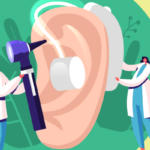Q: Is caffeine harmful? A: This is one of the most loaded questions about everyday health. Many studies have been conducted on the effects of caffeine on the body. Some of these effects are positive and some are negative. Some studies suggest a correlation between moderate caffeine consumption and lower risks of some diseases, while … Read More »
-
Does Caffeine Affect Hearing and Balance?
-
Q&A: Can Hearing Loss Be Cured?
From Silence to Sound: Treating One of the Most Important Senses With nearly 1 in 5 people worldwide living with hearing loss, an often chronic health condition affecting individuals of every age, many wonder whether there’s a cure. After all, having a cure would not only boost communication but also help address the social isolation, economic costs, … Read More »
-
A Feast for the Ears: Supporting Your Hearing Health Through Food
Never thought about food in relation to your ears? You’re not alone. But considering food is a critical source of elements crucial to healthy skin, muscles, organs, and more, it’s no wonder that nutrition and hearing are connected. Take children and hearing loss, for instance. Did you know that a lack of adequate nutrition early … Read More »
-
Allergies and Hearing Loss — What’s the Connection?
A: This is a great question! Let’s start with some allergy basics. Allergies An allergy is when your body’s defenses overreact to something that is not typically harmful. These are called allergens, and common ones include latex, pet dander, and peanuts. When you come across an allergen, your immune system goes into defensive mode. Chemicals … Read More »
-
8 Back-to-School Communication Tips
Make Hitting the Books Even Easier with These Helpful Tricks. It’s practically back-to-school time! Whether the students in your life are returning to class in person or online, keep these helpful tips in mind. Maximize lipreading. Hearing and lipreading work together to enhance communication, making clear sight lines between instructor and student all the more crucial. … Read More »
-
5 Reasons to Wear Your Hearing Aids
Here’s What You’re Missing When Skipping the Devices Wait — don’t mothball those hearing aids! Even after being properly fitted with technology, some hearing aid users fall out of the habit of wearing their devices. Rather than help the person hear better, live healthier, and engage with the world, the hearing aids sit … Read More »
-
Summer Noise: 4 Ways Your Hearing Aids Can Help
Turn Up Summer Fun With Hearing Aids People don’t often think “Fun!” when they think of hearing aids. But today’s hearing aids are designed to meet your needs no matter what’s going on. Let’s check out a few ways your hearing aids can actually enhance your fun this summer. Enjoy Group Conversations Outdoors Most hearing … Read More »
-
Use Audiobooks to Hone Your Hearing
Better Hearing Is a Process, Not an Event When you get hearing devices, your hearing improves dramatically. But there’s still plenty of fine-tuning to do. That’s why an experienced hearing care professional schedules follow-ups. As you encounter different environments in your life, you’ll notice sounds that don’t seem quite right. At your follow-ups, your provider … Read More »
-
Encouraging Tinnitus Research
Ringing in the Ears: Hope for Tomorrow, Solutions Today If you’ve ever felt the sensation of buzzing, humming, or whooshing in your ears, but no one around you seems to hear it, you’re not alone. It could be tinnitus, a condition experienced by anywhere from 4% to 37% of people around the world. There’s no cure yet, … Read More »
-
Tips to Help You Live Longer With Hearing Loss
It’s Not Just About Hearing Hearing loss can affect not only your well-being but your overall quality of life as well. If you have hearing loss, read on for ways to be the happiest, healthiest you. Hearing Loss and Falls Are Linked Research backs up the connection between hearing loss and falls. In one study, … Read More »










